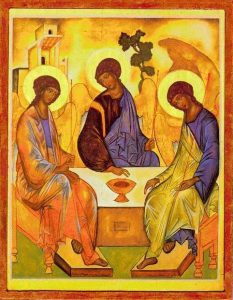HOMILY ADVENT WEEK 03 02 – Year II
God as Divine Dance
(Zeph 3:1-13; Ps 34; Mt 21:28-32)
****************************************
The Trappist monk and spiritual writer Thomas Merton taught that some people live “for” God; some people live “with” God, and some live “in” God.
The readings today invite us above all to live “in” God.
In the first reading, Zephaniah is addressing the city of Jerusalem, accusing it of not listening, not trusting, not drawing near to God – not living “in” God, although they were certainly religious and supposedly living “for” God. He looks to the day when the Lord will establish a humble, honest remnant.
In the Gospel, Jesus addresses the religious leaders and tells them a parable suggesting that they are not doing God’s will. Their sin is refusing to believe in John or him, and false pride and stubborn self-will. They were certainly very religious and supposedly living “for” God but in the end, were not living either with or in God. They were focused on keeping rules and regulations, but did not have an intimate personal relationship with God.
The situation seems to be the same today. While our pilgrimage group was in Israel recently, we were told not to use the Sabbath elevator, because it is programmed to stop on every floor of the hotel, because it would be work to push an elevator button. Our guide told us that the ultra-orthodox men spend all day studying the bible, while leaving their wives struggling to make ends meet and expected to bear children as long as they were able, which meant that area was full of large and very poor families. On the plane, there was a family that actually brought their own food on board to be sure that it was all “kosher.”
It was this externalism that Jesus tried to confront, at one point telling the religious leaders that it was not what they ate that made them unclean, but what was in their hearts. They were all about rules, regulations and keeping laws, yet neglecting their relationship with God.
How fortunate that we believe in Jesus, who summed up all the commandments into just two – love God with our whole being, and love others as we love ourselves.
Spiritual writer Richard Rohr OFM published a book in which he writes about God as a divine dance, or perichoresis, an ancient Greek termed used by some of the Church fathers and mothers. We are invited, not so much to keep rules and regulations, but to enter into an intimate, loving relationship or divine dance with the Father, Son and Holy Spirit.
This is a challenge for those who choose to read the bible literally, because the word Trinity is not found in the bible. The reality of the Trinity, however, and the intimate relationship that we are invited into, is clearly taught by St. Paul, who often refers to the Father, the Son and the Holy Spirit. Jesus himself often referred to the Father, himself as Son of God, and the Spirit that the Father would send us.
Our God is family, relationship, oneness, unity, intimacy, and love. Our faith in such a God is best expressed in terms of relationship and even a divine dance. In a sense, we and all of creation are a fourth member of the Holy Trinity, all connected and bonded within an intimate, dynamic, fluid and flowing relationship.

Rublev Trinity
That is the image of God the painter Andrei Rublev depicted in his famous painting of the Trinity, also known as the Hospitality of Abraham and Sarah. The three figures who appeared to Abraham and Sarah are pictured at table, in a delicate and gentle, yet loving and intimate relationship with each other.
I was visiting a family one day when their 15-year old daughter came in from a soccer tournament, threw down her duffel bag, went straight to her dad, sat on his lap, put her arm around his shoulder, laid her head against his and stayed there for a full two minutes, just soaking up his love, all without saying a word. He kept talking to me over her, while his wife carried on making supper and her siblings quietly kept on playing. I felt deeply touched and moved to my depths by this intimate, loving relationship between a father and his daughter. As I left their home, I realized I had just come as close to seeing God as intimate relationship, in this life with these eyes, as I ever would.
The Eucharist is itself always and at all times, a celebration of our Trinitarian God, as we pray in the name of the Father, the Son and the Holy Spirit.
So, let us continue to grow in an always more intimate relationship with our God, enjoying the divine dance in which God invites us to participate, and live in God.



